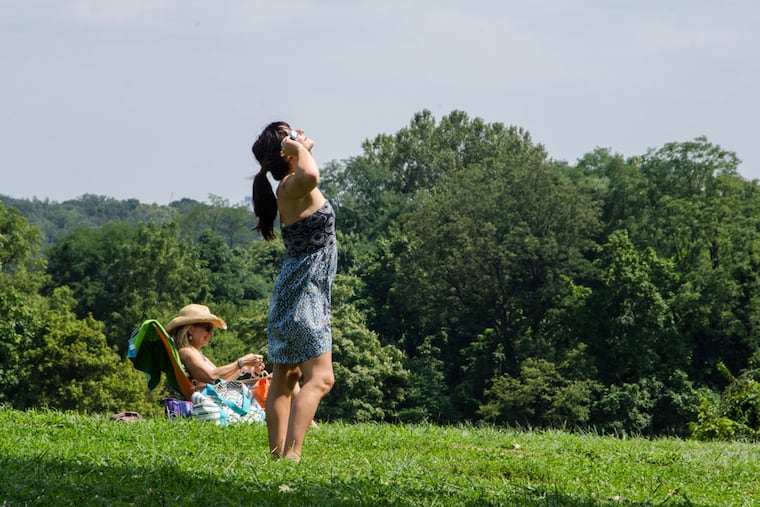Please don’t look directly at the sun during the eclipse (or ever)
Meanwhile, in the age of social media, more extreme theories about the eclipse are spreading far and wide, ranging in severity — from eclipses causing the plague to eclipses harming pregnancies.

Conspiracy theorists and apparent sun-damage denialists are out in full force ahead of Monday’s total eclipse. But experts warn looking directly at the sun’s rays comes with risks and you shouldn’t do it. Their warnings may not be enough for some.
Perhaps a tale as old as time, myths and unproven theories surrounding eclipses date back centuries.
NASA reports that the earliest account of an eclipse may date back 5,500 years. And since then, unproven theories ranging in severity — from eclipses causing the plague to eclipses harming pregnancies — have swirled around for just as long.
And while those rumors have been debunked and demystified by experts over the years, in the age of social media, more extreme theories about the eclipse are spreading far and wide.
As reported by Wired, social media channels and conspiracy-focused message boards have been flooded for weeks with over-the-top false claims questioning the eclipse’s legitimacy along with what will happen when the moon blocks out the sun.
Simultaneously, some theorists also falsely claim that warnings not to look directly at the sun are merely a ploy to control consumers and get people to buy eclipse glasses. It’s worth noting that plenty of eclipse glasses are available for free. In Philly, the Franklin Institute and the Science History Institute have free glasses.
Ahead of the eclipse, which will cross from Texas to Maine, experts are trying to get ahead of anxieties and inconveniences the day could cause — because of normal and expected events, not the apocalypse.
Here’s what we know.
Some areas expect loss of cell phone services — because of tourists, not the sun
Citing the sheer influx of tourists visiting areas in the eclipse’s path, some areas are preparing for cell phone service outages, caused by the surge of people using their phones at the same time nearby. It’s the same way that it’s hard to get reception at an Eagles game or Taylor Swift’s Eras concert.
The eclipse could impact power grids — because it’ll be dark for solar generation
As noted by Reuters, electric grids nationwide are anticipating a rapid decline in solar generation during the eclipse because of its expected path of totality — the time in which the sun will be completely blocked by the moon. While it will only be about five minutes of darkness in each area, the total amount of darkness across its multistate journey will last about an hour and a half.
And even when it’s not completely dark, the hours of increasing darkness as the sun enters and exits the path of totality will still impact the number of megawatts of solar power that will be generated, proving to be a major test for power grids which have doubled their solar power generation since the last solar eclipse took place in 2017.
Still, power grid operators aren’t too worried about outages or major problems, according to Vox.
National Guard is coming into areas — because of the influx of people, again, not the sun
In some cases, National Guard say they’ll be waiting on standby to assist first responders in areas that expect large groups of tourists.
“McCurtain County Emergency Management requested our support because they expect up to 100,000 additional people visiting their communities to watch the eclipse,” an Oklahoma National Guard commander said in a statement. “This influx of visitors has the potential to overtax local resources.”
You shouldn’t look directly at the sun (ever)
Scientists are also trying to remind people: please please please do not stare at the sun.
Directly going against Taylor Swift’s “Anti-Hero” lyrics (she’ll “stare directly at the sun, but never in the mirror”), NASA says it’s “never safe to look directly at the sun’s rays — even if the sun is partly obscured.” In fact, even when the sun is 99% obscured, it can still cause damage.
Even during the beginning and ending phases of total eclipses, experts warn you’ll still need eye protection and that you can only remove protective glasses when the moon has completely covered the sun during totality. This also applies if you’re looking through a camera, telescope, or binoculars — unless they have a special filter, you shouldn’t stare at the sun through them.
So what happens if you peek?
The sun is super bright and looking for any longer than a few seconds can damage the cells in the retina (the back of the eye). And that damage can be permanent, causing someone to lose some of their central vision. Because eclipses last so long from start, to totality, to end, USA Today warns that viewers may feel compelled to glance a few seconds at a time. But those glances will add up and could seriously harm a person’s eyesight. Just don’t do it, OK?